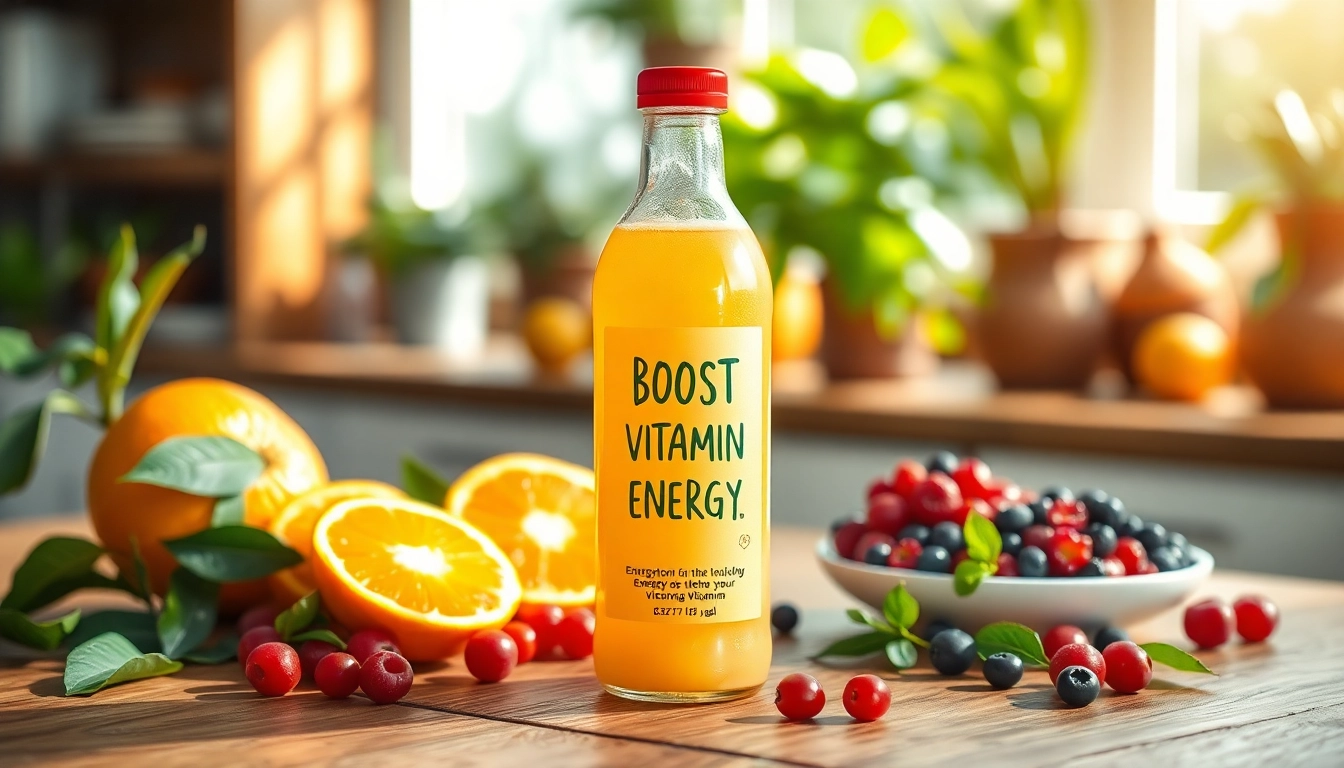Boost Your Day with Energy Vitamins: Uncover Vitality and Wellness Insights
Understanding Energy Vitamins
In today’s fast-paced world, maintaining high energy levels can often feel like a monumental task. As we juggle numerous responsibilities—work commitments, family duties, and personal interests—it’s understandable that some days we may feel drained. One effective way to combat low energy levels is through the incorporation of Energy Vitamins into our daily diets. This article explores what energy vitamins are, how they function in the body, and their sources, helping you unlock enhanced vitality and wellness.
What Are Energy Vitamins?
Energy vitamins refer to a group of essential nutrients that play a critical role in stimulating energy production within the body. While vitamins generally support various bodily functions, certain vitamins—particularly those in the B-complex group—are renowned for their energy-boosting properties. They assist in converting carbohydrates, proteins, and fats into usable energy, thereby invigorating both physical and mental performance.
How Energy Vitamins Work in the Body
Energy vitamins function at a cellular level, essentially acting as cofactors in metabolic processes. For instance, B vitamins facilitate the conversion of glucose into energy. Each B vitamin performs unique roles within energy metabolism: Vitamin B1 (Thiamine) is crucial for glucose metabolism; Vitamin B2 (Riboflavin) aids in energy production from fats, proteins, and carbohydrates; while Vitamin B12 is essential for red blood cell formation and overall energy levels. Moreover, vitamins like C and D also play a role in enhancing the immune system and overall health, indirectly influencing energy.
Common Sources of Energy Vitamins
Many energy vitamins are readily available in a balanced diet. Here are some common sources:
- Whole Grains: Rich in B vitamins, particularly B1, B2, and B3.
- Leafy Greens: Excellent sources of folate (Vitamin B9) and magnesium.
- Citrus Fruits: High in Vitamin C, which boosts immune function.
- Meat and Dairy: Essential for Vitamin B12 and protein intake necessary for energy production.
- Nuts and Seeds: Packed with B vitamins, along with healthy fats that support sustained energy.
The Role of B Vitamins in Energy Production
B Vitamins: Your Energy Powerhouse
B vitamins, collectively referred to as the B-complex group, are pivotal for energy metabolism. These vitamins work synergistically, transforming the food we consume into useful energy. Here’s a closer look at some key B vitamins:
- B1 (Thiamine): Promotes carbohydrate metabolism, vital for energy production.
- B2 (Riboflavin): Involved in the breakdown of carbohydrates, fats, and proteins.
- B3 (Niacin): Aids in energy production and DNA repair, contributing to overall health.
- B5 (Pantothenic Acid): Essential for synthesizing Coenzyme A, which is crucial for fatty acid metabolism.
- B6 (Pyridoxine): Supports protein metabolism and the creation of neurotransmitters.
- B12 (Cobalamin): Important for red blood cell formation and neurological function, impacting energy levels significantly.
Deficiency Risks and Symptoms
Deficiencies in B vitamins can lead to a range of issues, primarily fatigue, weakness, and decreased cognitive function. For example, a lack of Vitamin B12 may result in anemia, presenting symptoms such as pallor, dizziness, and shortness of breath. Recognizing these symptoms early can facilitate timely intervention through dietary changes or supplementation.
Natural Food Sources of B Vitamins
Incorporating the following foods into your diet can ensure you receive adequate B vitamins:
- Whole grains: Brown rice, oats, and whole wheat bread.
- Meats: Chicken, beef, and fish.
- Dairy products: Cheese, yogurt, and milk.
- Eggs: Particularly rich in B12.
- Legumes: Such as lentils and beans.
- Vegetables: Spinach, broccoli, and peppers.
Other Essential Vitamins for Sustained Energy
The Significance of Vitamin C
Vitamin C is often celebrated for its immune-boosting properties, but it also plays an essential role in energy production. As an antioxidant, it helps protect cells from oxidative stress, which can impair energy levels. Additionally, Vitamin C aids in the absorption of iron, a mineral crucial for energy metabolism.
Importance of Vitamin D for Energy Levels
Vitamin D, frequently dubbed the “sunshine vitamin,” is pivotal for overall health and can influence energy levels. Low levels of Vitamin D have been linked to fatigue, muscle weakness, and mood disorders. Ensuring adequate sun exposure and incorporating Vitamin D-rich foods, such as fatty fish and fortified dairy products, into your diet can help maintain optimal energy levels.
Iron and Magnesium: Supporting Your Energy Needs
Iron and magnesium are critical minerals that complement energy vitamins in promoting vitality. Iron is vital for hemoglobin in red blood cells, which transports oxygen throughout the body. Low iron levels can result in fatigue and reduced performance. Magnesium, on the other hand, aids over 300 biochemical reactions, including energy production and muscle function, making it crucial for maintaining high energy levels.
Energy Vitamin Supplements: Are They Worth It?
Evaluating the Effectiveness of Energy Supplements
The market offers a plethora of energy vitamin supplements claiming to boost vitality. However, the effectiveness of these products may vary widely based on individual dietary needs, lifestyle factors, and existing vitamin levels. Supplements can provide a convenient way to fill nutritional gaps, particularly for individuals with dietary restrictions or higher energy demands.
Safety Considerations When Using Supplements
Safety is paramount when considering vitamin supplementation. Overconsumption of certain vitamins, especially fat-soluble vitamins like A, D, E, and K, can lead to toxicity. It’s essential to consult with healthcare professionals before starting any new supplement regimen to tailor it to your individual needs and minimize risks.
Choosing Quality Energy Vitamin Products
Selecting high-quality energy vitamin products can significantly impact their effectiveness. Look for reputable brands that disclose ingredient sources, provide third-party testing for purity, and avoid excessive fillers or artificial additives. Always check labels for appropriate dosages and ensure the product aligns with your specific health goals.
Personalizing Your Energy Boosting Routine
Incorporating Energy Vitamins into Your Diet
To maximize the benefits of energy vitamins, it’s crucial to include a variety of foods in your diet that provide these essential nutrients. Consider meal prepping to ensure easy access to balanced meals that include energy-boosting foods. For instance, incorporating a smoothie rich in spinach (for iron), banana (potassium), and berries (Vitamin C) can provide a quick energy lift.
Combining Vitamins with Lifestyle Changes
While vitamins do play a significant role in maintaining energy, combining them with lifestyle changes can yield even greater benefits. Regular exercise can enhance the efficiency of energy metabolism, while adequate sleep ensures proper recovery and rejuvenation, both critical for maintaining high energy levels throughout the day.
Tracking Energy Levels and Adjustments Needed
Keeping a journal to track daily energy levels can help you identify patterns associated with different foods, activities, and sleep habits. If you notice consistent fatigue, it may be time to evaluate your diet, lifestyle, or consult a healthcare professional for potential deficiencies or conditions affecting your energy levels.














Post Comment